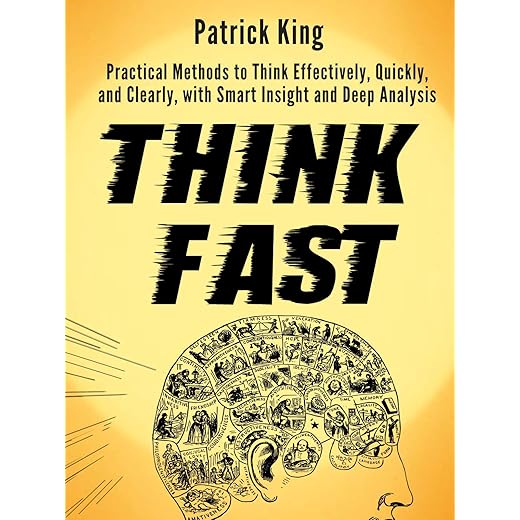Hey there! Welcome to my blog post where we’re going to dive deep into the wonderful world of mental agility. You know, that amazing ability to think on your feet, adapt to new situations, and solve problems with ease. Trust me, having strong mental agility can truly be a game-changer in today’s fast-paced world. So, if you’re curious about the benefits it can bring to your life, stick around because we’re about to embark on an exciting journey together!
Sharpen Your Mind with These Top-Selling Mental Agility Books



Enhanced Problem-Solving Skills
In today’s fast-paced world, having strong problem-solving skills is more important than ever. Whether it’s finding innovative solutions at work or navigating unexpected challenges in our personal lives, the ability to think quickly and adapt to new situations is a valuable asset. In this blog section, we will explore how enhancing your problem-solving skills can unlock your mental agility and help you become a more effective problem solver.



The Power of Mental Agility
Mental agility refers to the ability to think and respond swiftly, flexibly, and creatively. It enables individuals to approach problems from different angles, consider multiple perspectives, and generate innovative solutions. Here are a few key benefits of developing and enhancing your mental agility:
- Quick Thinking: When faced with a problem, individuals with strong mental agility can process information rapidly and make decisions more efficiently. This allows them to seize opportunities and respond effectively in time-sensitive situations.
- Adaptability: In a constantly changing world, the ability to adapt is crucial. Mental agility enables individuals to adjust their thinking and strategies to fit new circumstances, making them more resilient and able to thrive in dynamic environments.
- Creativity: Mental agility fosters creativity by encouraging individuals to explore unconventional approaches and think outside the box. It helps break free from rigid thinking patterns and promotes innovative problem-solving techniques.
- Improved Decision Making: With enhanced mental agility, individuals can consider a wide range of variables, predict potential outcomes, and make well-informed decisions. This leads to better problem-solving outcomes and more effective leadership.
Real-Life Examples
To better illustrate the power of enhanced problem-solving skills and mental agility, let’s take a look at a couple of real-life examples:
Example 1: Tesla’s Autopilot System
Tesla, the renowned electric car manufacturer, faced a complex problem when developing their Autopilot system. They needed to create an advanced driving assistance system that could safely navigate various road conditions and situations. By leveraging the mental agility of their engineers, Tesla was able to develop a solution that combines machine learning, sensor technology, and real-time data analysis to provide a highly efficient and reliable autonomous driving experience.
Example 2: Apple’s iPhone Face ID
Apple’s introduction of the Face ID feature on their iPhones required overcoming numerous technological challenges. By enhancing their problem-solving skills and mental agility, Apple’s engineers devised a sophisticated facial recognition system that combines machine learning algorithms, depth sensing cameras, and secure data encryption. This innovative solution revolutionized smartphone security, setting a new standard in the industry.
Enhancing Your Problem-Solving Skills
Now that we understand the importance of mental agility and how it can drive effective problem-solving, let’s explore some practical ways to enhance your problem-solving skills:
- Practice Critical Thinking: Engage in activities that promote critical thinking, such as puzzles, brain teasers, or even philosophical discussions. This helps develop your ability to analyze problems objectively and think logically.
- Seek Diverse Perspectives: Surround yourself with people from different backgrounds and with varying viewpoints. This exposure to diverse perspectives can broaden your own thinking and enable you to consider alternative solutions to problems.
- Embrace Continuous Learning: Stay curious and continuously seek opportunities to learn and grow. Engaging in new experiences and acquiring new knowledge will expand your problem-solving toolkit and enhance your mental agility.
- Develop a Growth Mindset: Embrace challenges and view failures as opportunities for growth. Adopting a growth mindset allows you to persevere through obstacles and fuels your motivation to find innovative solutions.
Improved Decision Making
In today’s fast-paced world, making effective decisions is crucial for personal and professional success. However, the ability to analyze information, consider different perspectives, and make informed choices in a timely manner is not always easy. This is where mental agility comes into play. In this blog section, we will explore how mental agility can improve decision making, providing you with practical tips and real-life examples.



Understanding Mental Agility
Mental agility refers to the ability to think quickly, adapt to new situations, and effectively process information. It allows individuals to navigate complex problems, evaluate multiple options, and make informed decisions. Here’s how mental agility enhances decision making:
1. Efficient Information Analysis
Mentally agile individuals possess the skills required to swiftly analyze information. They can break down complex data, identify relevant details, and extract insights. By efficiently processing information, they are better equipped to make well-informed decisions. For instance:
- When comparing two smartphones, a mentally agile consumer can quickly assess the specifications, features, and user reviews to determine which device aligns best with their needs.
2. Consideration of Multiple Perspectives
To make sound decisions, it’s essential to consider different viewpoints. Mental agility enables individuals to see beyond their own biases and take into account various perspectives. This skill allows for a more comprehensive evaluation of options, resulting in better choices. Consider the following example:
- A socially conscious shopper, with mental agility, may consider not only the price and quality of a product but also its environmental impact and ethical practices before making a purchase.
3. Timely Decision Making
In today’s fast-paced world, time is often of the essence. Mental agility allows individuals to make quick decisions without compromising quality. They can assess the available options, weigh the pros and cons, and reach a decision promptly. Here’s an example:
- A project manager, with mental agility, can effectively evaluate the strengths and weaknesses of different project management software solutions, enabling them to make a timely decision and keep the project on track.
Real-Life Examples
To better illustrate the impact of mental agility on decision making, let’s explore a few real-life scenarios:
1. Choosing a Laptop
- Mentally agile individuals can compare the specifications, features, and prices of different laptops to find the one that suits their needs best. They can quickly analyze the RAM, storage capacity, processor speed, and other essential factors to make an informed decision.
2. Selecting a Travel Destination
- When planning a vacation, mentally agile individuals consider multiple factors such as weather, cost, safety, activities, and cultural experiences. They analyze various destinations, weigh the pros and cons, and choose a location that aligns perfectly with their preferences and budget.
Conclusion
Mental agility is a valuable skill that enhances decision making. By efficiently analyzing information, considering multiple perspectives, and making timely choices, individuals can improve their decision-making process. Whether it’s selecting a laptop, choosing a travel destination, or making business decisions, mental agility provides an advantage in navigating complex choices. So, embrace mental agility and empower yourself to make better decisions in all aspects of life.
Better Stress Management
Stress has become an integral part of our daily lives, often leaving us feeling overwhelmed and drained. However, with the right tools and techniques, we can effectively manage stress and regain control of our well-being. One key factor in achieving this is cultivating strong mental agility. In this blog section, we will explore how mental agility can help individuals manage stress more effectively, providing concrete examples and practical tips along the way.
What is Mental Agility?
Mental agility refers to the ability to adapt and respond to situations with flexibility and ease. It involves remaining calm, staying focused, and finding constructive ways to cope with challenging circumstances. When it comes to stress management, mental agility plays a crucial role in helping individuals navigate through difficult times and maintain a sense of balance.
Benefits of Mental Agility in Stress Management
1. Calmness in the Midst of Chaos
Mentally agile individuals possess the ability to stay calm even in highly stressful situations. They are better equipped to handle pressure, making it easier to approach challenges with a clear mind and make rational decisions. For example, imagine a nurse in a busy emergency room who remains composed and focused during a chaotic shift. Their mental agility allows them to provide the best care possible, all while managing stress effectively.
2. Enhanced Focus and Productivity
When stress takes hold, it can be challenging to concentrate on tasks at hand. However, individuals with strong mental agility are able to maintain focus, allowing them to complete their work efficiently. For instance, think of a software developer who is facing a tight deadline. By utilizing mental agility, they can prioritize their tasks, block out distractions, and effectively manage their stress levels, leading to increased productivity and better outcomes.
3. Constructive Coping Mechanisms
Managing stress requires finding healthy coping mechanisms, rather than resorting to harmful habits. Mentally agile individuals are adept at identifying and utilizing constructive strategies to cope with stress. For instance, someone facing a particularly challenging project may take regular breaks, practice mindfulness, or engage in physical exercise to reduce stress levels. These proactive coping mechanisms not only alleviate stress but also promote overall well-being.
Practical Tips for Enhancing Mental Agility
Now that we understand the importance of mental agility in stress management, let’s explore some practical tips to help you enhance your mental agility:
- Practice mindfulness and meditation techniques to cultivate a calm and focused mind.
- Engage in regular physical exercise, such as yoga or jogging, to boost your mental resilience.
- Challenge yourself with new tasks or hobbies to expand your comfort zone and strengthen your adaptive skills.
- Develop a positive mindset by focusing on gratitude and practicing self-compassion.
- Prioritize self-care activities that bring you joy and relaxation.
Enhanced Learning and Cognitive Abilities
In today’s fast-paced world, having strong mental agility is becoming increasingly important. It not only helps us stay sharp and focused but also facilitates faster learning, improved memory, and increased cognitive flexibility. In this blog section, we will explore how enhanced learning and cognitive abilities can have a profound impact on our lives and provide concrete examples of how brands and products are harnessing these principles to help individuals acquire knowledge and skills more efficiently.
The Power of Mental Agility
Mental agility refers to the capacity to think, learn, and solve problems quickly and effectively. When we have strong mental agility, we can process information more efficiently, adapt to new situations, and make better decisions. Here are some key benefits that come with enhanced learning and cognitive abilities:
1. Faster Learning
With a sharp mind, we are able to absorb new information at an accelerated pace. This means that we can grasp concepts more quickly, learn new skills in a shorter time frame, and stay ahead in our personal and professional pursuits. Brands like Rosetta Stone and Duolingo have capitalized on this concept to create language learning platforms that leverage enhanced learning techniques, enabling users to become proficient in a new language in a matter of months rather than years.
2. Improved Memory
Enhanced cognitive abilities also enhance our memory retention. When we can process information more effectively, it becomes easier to encode and recall important details. This is especially crucial in educational settings, where students need to retain vast amounts of information. Anki, a popular flashcard app, utilizes spaced repetition algorithms to optimize memory retention and provide a seamless learning experience.
3. Increased Cognitive Flexibility
Cognitive flexibility refers to the ability to switch between different tasks, perspectives, and problem-solving strategies. It allows us to approach challenges from various angles, adapt to changing circumstances, and think outside the box. Brands like Lego have long understood the importance of cognitive flexibility in child development. Their building blocks not only foster creativity but also encourage children to think critically and flexibly as they construct and deconstruct various structures.
Harnessing Enhanced Learning and Cognitive Abilities
Now that we understand the benefits of enhanced learning and cognitive abilities, let’s explore how brands and products are harnessing these principles to provide tangible benefits to consumers. Here are a few examples:
1. Brain-Boosting Supplements
Brands like Alpha Brain and Neuriva have developed supplements that claim to enhance cognitive function, memory, and focus. These supplements often contain ingredients such as B-vitamins, omega-3 fatty acids, and herbal extracts that are believed to support brain health. While research on the effectiveness of such supplements is still ongoing, many individuals report improved mental clarity and focus after incorporating them into their daily routines.
2. Gamified Learning Platforms
Several brands, such as Khan Academy and Quizlet, have utilized gamification techniques to make learning more engaging and enjoyable. By incorporating elements of competition, rewards, and interactive challenges, these platforms tap into our natural inclination for play and make the learning process more enjoyable and effective. Users can earn badges, unlock levels, and compete with friends, all while acquiring new knowledge and skills.
3. Virtual Reality (VR) Training
Virtual reality has revolutionized the way we learn and train in various fields. From flight simulators used by pilots to medical training programs, VR provides a realistic and immersive learning experience. By simulating real-life scenarios, individuals can practice and develop their skills in a safe and controlled environment. For example, Osso VR offers immersive surgical training for medical professionals, allowing them to hone their surgical techniques without the need for a physical patient.
The Power of a Sharp Mind: Unlocking the Benefits of Mental Agility
In conclusion, it is clear that there are many benefits to having strong mental agility. From enhancing problem-solving skills to improving decision making and managing stress, the advantages are numerous. Additionally, strong mental agility also boosts learning and cognitive abilities, allowing individuals to lead more fulfilling and successful lives. By prioritizing activities that promote mental agility, such as puzzles, meditation, and continuous learning, we can unlock our full potential and reap the rewards of a sharp and adaptable mind.








I would love to see an article on how mental agility can benefit personal relationships and communication skills. It’s such an important aspect of our lives!
That’s an excellent suggestion! Mental agility plays a crucial role in personal relationships and communication skills. I’ll definitely consider writing an article on that topic. Thank you for your input!
Thank you for sharing your success story! It’s great to hear how strong mental agility has positively impacted your problem-solving skills and decision making. It truly is a valuable asset.
I have personally experienced the benefits of having strong mental agility. It has helped me solve complex problems at work and make better decisions. It’s like having a mental superpower!
I’ve found that practicing mindfulness and meditation has helped enhance my mental agility. It has improved my focus and cognitive abilities. Highly recommend giving it a try!
The benefits of mental agility are not limited to just the workplace. It has helped me in my hobbies as well, such as playing chess. It’s amazing how it enhances strategic thinking!
While mental agility sounds amazing, I struggle with managing stress. I would love to hear some tips or techniques on how to improve stress management.
Managing stress can be challenging, but it’s definitely possible to improve. I’ll make sure to cover some tips and techniques on stress management in future articles. Thank you for your suggestion!
I recently read a study that linked mental agility with a reduced risk of cognitive decline in older adults. It’s fascinating how this skill can benefit us throughout our lives!
Thank you for sharing that interesting information! It’s true that mental agility has a positive impact on cognitive health as we age. It’s great to know that it can benefit us in the long run.